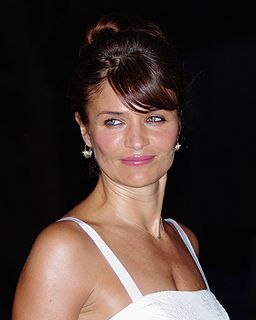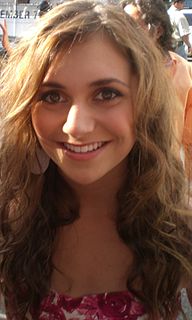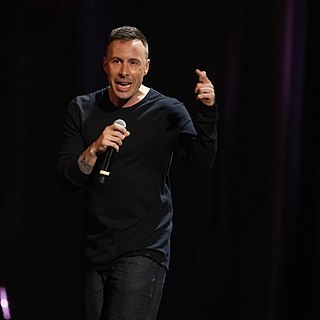A Quote by Helena Christensen
When on the set of a film, you have to play natural for entire scenes in a very unnatural environment. You have to express emotions and interact with other actors and also use your voice.
Related Quotes
To be an actor and a director, I actually felt it helped me tremendously to be in the scenes of The Hollars, because as you can see, they're very intimate, very intense scenes. You don't want to break the actor's character and you don't want to break their momentum, so as the actor, I tried not to call cut as much as I could, and almost make it feel like a play, just set this environment where these amazing actors could do what they wanted to do.
Sometimes I get a little confused because with dancing I can express my emotions with my body. With acting you have to do it with your face and your expressions, and then with animated shows you have to use your voice and use your inflections. So it's definitely a challenge to transfer from each genre of entertainment.
There is nothing unnatural in this world," he said. "An unnatural thing is a thing that could never happen in nature. I happened. I am natural, and the things I want are natural. The power of your mind, and your beauty, even when you've been drugged in the bottom of a boat for two weeks, covered in grime and your face purple and green - your unnatural beauty is natural. Nature is horrifying.
But when there were certain moments or scenes that required a very specific nuance or performance, I myself would act out the scene or the sequence and that would inspire the actors. Of course, I can't really express emotions on camera, but I was very active in showing a certain action or a blocking for an actor. I would also participate in certain stunts myself and because of that, I would get bruises or cuts on my knees and elbows.
I think film is a world of directors. Theater is a world of actors. Or, theater is for actors as cinema is for directors. I started in theater. Filming is as complete as directing film. In theater, you are there, you have a character, you have a play, you have a light, you have a set, you have an audience, and you're in control, and every night is different depending on you and the relationship with the other actors. It's as simple as that. So, you are given all the tools.
In your system of reality you are learning what mental energy is, and how to use it. You do this by constantly transforming your thought and emotions into physical form. You are supposed to get a clear picture of your inner development by perceiving the exterior environment. What seems to be a perception, an objective concrete event independent from you, is instead the materialization of your own inner emotions, energy, and mental environment.
In the old days when I first was coming up, you would turn up on set in the morning with your coffee, script, and hangover and you would figure out what you were going to do with the day and how you were going to play the scenes. You would rehearse and then invite the crew in to watch the actors go through the scenes. The actors would go away to makeup and costume and the director and the DP would work out how they were going to cover what the actors had just done.
What I love in working on film is just working with actors. It's one thing to write scenes alone over a keyboard and to imagine the actions and reactions in your head, but it's a completely other thing to hear actors speaking your words, to see their bodies bringing the fullness of emotion, need, desire and pain to life right in front of you. It's amazing.










































